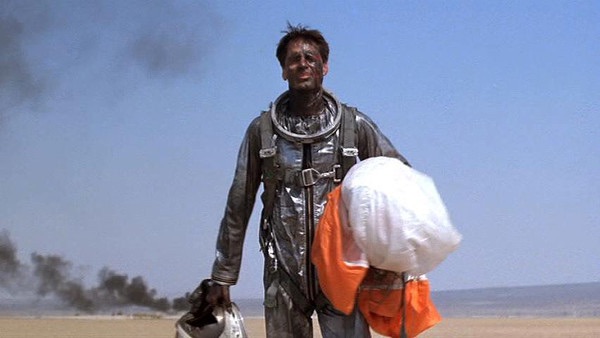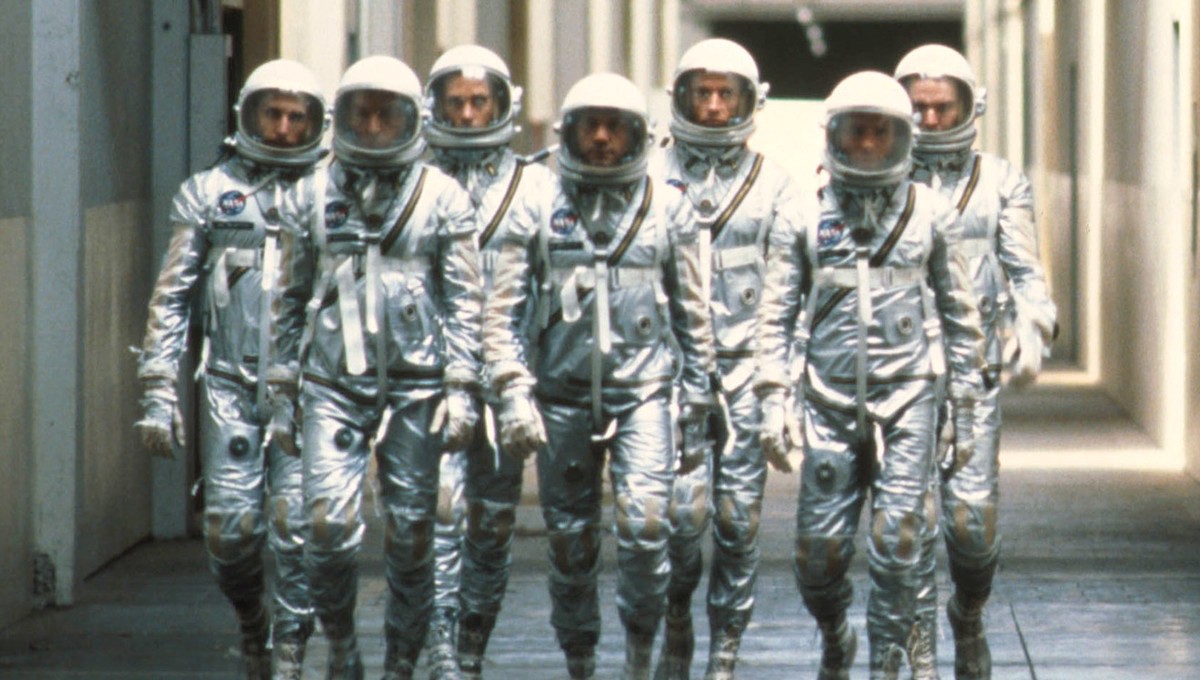A Life in Film is a project where I’m writing about a movie from every year I’ve been alive.
1983: The Perils of Adaptation
THE RIGHT STUFF (dir. Philip Kaufman)
With some of these, I get very nervous about doing the actual writeup. And this is very much one of those. Because no matter how much I want to—and I want to pretty badly—I just don’t like this movie very much. And I know it’s a (partial) consensus classic, and it feels weird to go against the consensus. But I can’t help it! No matter how much other people like it, no matter how much it involves people I like, concepts I like, and adapts a book I like, I just can’t really get with The Right Stuff. I don’t hate it, but, except for some individual sequences (and maybe one of the ongoing storylines), I can’t get better than lukewarm about it.
For me, what hobbles The Right Stuff is that the movie doesn’t know what it wants to be. Kaufman and William Goldman famously fought over the screenplay, with Goldman eventually leaving and washing his hands of the matter. And that unresolved fight is still present on the screen, giving us a long movie that meanders, bounces wildly in tone, and lacks focus. Goldman wanted to focus on the Mercury 7 and the patriotic hoopla around them; Kaufman wanted to focus on Chuck Yeager and the cult of tough-guy pilot machismo around him. In practice, even though Goldman bailed, we get an undercooked Mercury 7 movie stuffed inside a pretty good, tight dramatic short about Chuck Yeager. I talked a minute ago about feeling like I’m swimming against the current on this one, but I’m not completely alone; my understanding is that all of the surviving Mercury astronauts who saw the movie hated it (except for Scott Carpenter, who honestly seems like such a chill guy that he just liked everything). Conversely, Chuck Yeager supposedly loved it, but of course he would; the thing the movie most clearly succeeds at is making him look like the coolest guy who ever lived.

I guess the part about all of this that’s interesting to me is that this conflict flows directly out of the Tom Wolfe book the movie is adapting, a book that at one point I would have named as my favorite. Wolfe also sandwiches the Mercury 7 inside of framing Yeager bits, and it feels a bit structurally weird in print, too; but text is much more forgiving than film, and a book can (within broad limits) be any length it needs to be to get a comparative point across. The argument in favor of the split is that the whole project is to compare and contrast Yeager’s world with that of the Mercury 7; but that’s a much easier thing to do in prose with unlimited space. In a visual, action-oriented medium, it’s tougher to get it to come across, and I don’t think Kaufman manages it. Writers are always warned, when we get the idea to write a screenplay, that writing for screen is far harder than writing for the page, and I feel like the two incarnations of The Right Stuff are an object lesson in this; Wolfe, with more room to maneuver, can use lively prose to smooth over awkwardness in a way that’s just not available to Kaufman.
And so about that book: there was a point, 15 or 20 years ago, when I would have cited it as my favorite book. I still like it quite a bit, but I’ve definitely cooled down some. The first read or two (I’m a biiiiig rereader, big fan of Hemingway’s conceit of old books as old friends you have to go hang out with again from time to time to check in) dazzle you with Wolfe’s lively use of language and excellent choice of subject matter; Yeager and the Mercury 7, and the shifting comparison between the two, really do make for a fascinating read. But on later revisits, some seams start to show. Wolfe either is or pretends to be (and his later career writing ill-thought-out fiction leads me to think it’s “is”) kind of a lazy thinker, and is prone to jumping to conclusions, making universal assertions that don’t hold (I really doubt that every airline pilot fakes their accent to sound like Chuck Yeager, or that they did so when Wolfe was writing), and generally favoring the version of a story that suits his purposes. And also, on later rereads, it was hard not to get the sense from the book that Wolfe was sort of the nerdlinger following the jocks around, hoping that they’ll like him if he makes them look cool.

I want to be clear: it’s not that I hate this movie! There’s definitely some great stuff in here. All of the Yeager scenes crackle; you can tell that this is where Kaufman’s heart was. Most of the cast is fantastic; for whatever reason, this is one of my favorite Scott Glenn roles (counterpoint: even though I normally like both of them very much, holy shit do Jeff Goldblum and Harry Shearer not work in this movie, bringing a tonal-conflict screech into the picture every time they appear; I don’t think it’s really their fault, though—their characters are a prime example of a space where Wolfe had plenty of time to develop an idea and modulate it with language, while Kaufman has limited space to play up the absurdity and therefore has to make it as huge and broad as possible). There are lots of great individual shots and sequences in this movie, and I think these are what the consensus-masterpiece rep rests on.
But honestly, even setting aside the dual-story problem, the subject matter has a structural problem that, from where I sit, looks like it would always make a dramatic arc difficult. The Mercury program is ostensibly the dramatic engine for the movie. And: great, it’s a very dramatic thing that happened. But there were six Mercury flights, and the drama climaxed with John Glenn’s, the third. Which is a great sequence in the movie, as is its aftermath. But then the story has to keep going… and the subsequent flights just don’t have the stakes. This again is where print’s more forgiving than film; we don’t seem to need crescendos in a book the way we do on film. A book can lose momentum but keep you hooked with prose and argument; movies operating on pure narrative can’t. Wolfe can kind of make it interesting, or at least funny, that Gordo Cooper falls asleep in a rocket. In a movie, there’s no punch there.
The last thing working against The Right Stuff is just that we’re so saturated now in great, exciting space and NASA cinema that whatever novelty it had in 1983 just isn’t accessible anymore. Between For All Mankind and Masters of the Air, Apple tv has multiple tv shows now that outpunch The Right Stuff in terms of raw aviation/space spectacle (if not always on drama). I’m not normally a Ron Howard champion, but Apollo 13 delivers a much tighter and more dramatic (and equally true) NASA story. Hell, HBO’s From the Earth to the Moon does a better job of showing the drama inherent to the development of the early space program.
I dunno. If you love The Right Stuff, I’m sincerely glad it’s there for you, and I don’t want to talk you out of it. It could be that I was just too attached to the book when I saw the movie, and could never get past the differences inherent to adaptation. But for me, it’s not one I’m likely to go back to, aside from watching the Yeager-breaks-the-sound-barrier sequence every now and then.